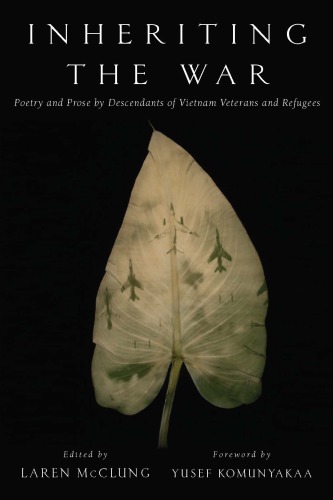
Inheriting the War
Poetry and Prose by Descendants of Vietnam Veterans and Refugees
کتاب های مرتبط
- اطلاعات
- نقد و بررسی
- دیدگاه کاربران
نقد و بررسی

October 15, 2017
McClung (writing, New York Univ.; Between Here and Monkey Mountain) serves as editor of this poignant collection of poems and short stories by 61 descendants of soldiers and refugees of the Vietnam War. Although these writers did not experience the war directly, the profound impact it had on their lives is palpable. A variety of viewpoints are represented by this diverse group of authors. However, some common themes are found in many of the writings: an emotional distance between descendant and ancestor, and traveling to Vietnam in an attempt to understand their parent better. Stories reveal childhoods involving neglect, abuse, and learning about the horrors of war at a young age. Taken as a whole, this work reveals how psychological trauma can have ripple effects through later generations. VERDICT This book intersects history, literature, and psychology and will appeal to readers interested in those subjects; those wishing to learn more about the Vietnam War, poetry, or transgenerational trauma will also find this an engrossing read. See In Country, edited by John Prados, for an anthology by individuals who experienced the war firsthand.--Joshua Wallace, Tarleton State Univ. Lib. Stephenville, TX
Copyright 2017 Library Journal, LLC Used with permission.

December 18, 2017
The physical and emotional aftereffects of the Vietnam War continue to ripple through families, as this comprehensive anthology shows, as the stories and traumas of those involved are passed down like genetic traits. The work includes both poetry and prose (with several category-defying pieces) and features such literary luminaries as Suzan-Lori Parks, Ocean Vuong, and Nick Flynn. Tom Bissell elucidates childhood with a veteran father: “At every meal Vietnam sat down, invisibly, with our families.” For poet Brandon Courtney, the specter was violent: “the same ashen hand/ that formed his fist/ that christened drywall,/ my mother’s lip.” In a stirring essay, poet Terrance Hayes describes meeting his biological father and learning of his grandfather’s actions during the war. Not all of the authors are descendants; Andrew X. Pham chillingly recounts his attempt to flee Saigon with his family as the city fell. Ben Quick’s informative essay on Agent Orange veers into the personal, explaining that the likely cause of his birth defect was his father’s exposure to the chemical. This penetrating and powerful collection brings together some of the most talented, haunted voices of those affected by the Vietnam War.

November 1, 2017
The language of war turns the other into an objectthe language of literature humanizes, writes McClung in her introduction to a collection featuring 61 contributors (and five translators)62 counting Yusef Komunyakaa's resonating prefaceeach intimately affected by the Vietnam War. Composing in English, Vietnamese, French, even Hebrew, these diasporic voices emanate forth from the children of U.S. veterans, from survivors-made-refugees, from one writer who is bothPulitzer-nominated poet Bruce Weigl's adopted Vietnamese daughter, Hanh Nguyen Willbond, who shares her transformative experience performing her father's iconic poem, Song of Napalm. Dense with confrontation, desperation, and suffering, this volume also resonates with agency, empathy, even forgiveness. Alas, the collection is uneven, with a gaping divide between the famous (MacArthur fellows Viet Thanh Nguyen, Suzan-Lori Parks, Governor-General's Award winner Kim Thuy) and some of the lesser known. Standout surprises, however, provide balance, including T. K. Le's Part of Memory Is Forgetting, Phong Nguyen's The Wheel of Memory, and Brian Schwartz's Invasion. An impelling message does emerge: Through the narrative of others we can more clearly see the world, and in them, we see ourselves. (Reprinted with permission of Booklist, copyright 2017, American Library Association.)

























دیدگاه کاربران